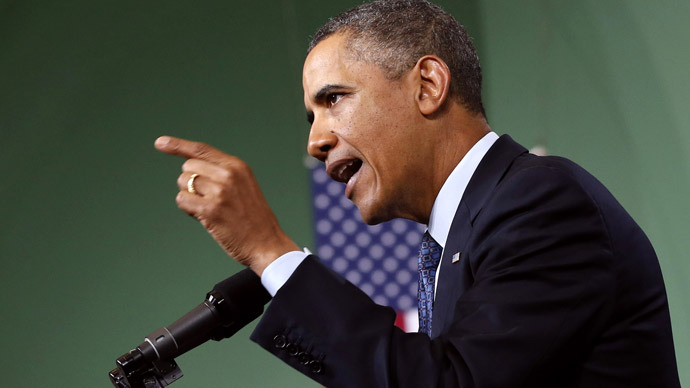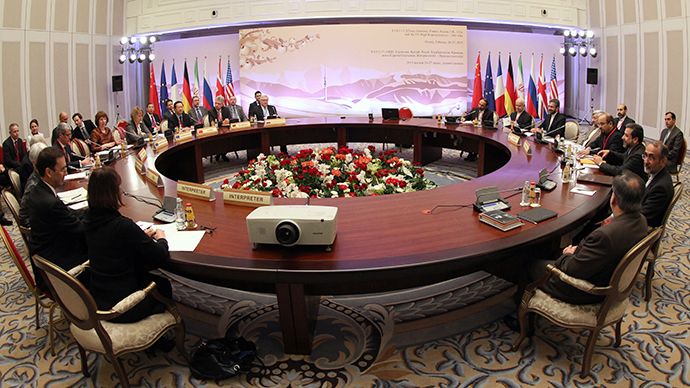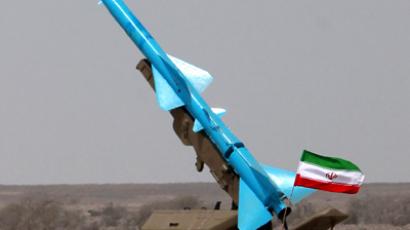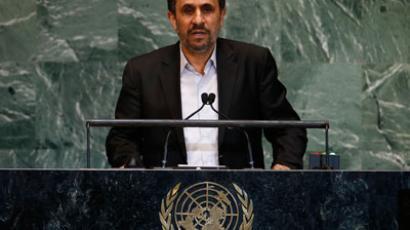Obama to threaten Iran with military strike in June, Israeli media reports

President Barack Obama says the United States could launch an attack on Iran as early as this June, Israeli media reports.
According to a report on Israel’s Channel 10 News that has since been picked up by the Times of Israel, Pres. Obama will use an upcoming meeting overseas to discuss a military strike on Iran. Pres. Obama is scheduled to visit Israeli Prime Minister Benjamin Netanyahu next month, and during the get-together the two leaders will reportedly work out the details for a possible assault.
Pres. Obama will tell Netanyahu that a “window of opportunity” for a military strike on Iran will open in June, Channel 10 claims.
Israel has long-urged the White House to use its military prowess to intervene in Iran’s rumored nuclear weapon procurement plan, demands which have by-and-large been rejected by the Obama administration. According to the latest reports, though, the United States might finally be willing to use its might to make a stand against Iran’s race for a nuke.
“I have conversations with Prime Minister Netanyahu all the time. And I understand and share Prime Minister Netanyahu’s insistence that Iran should not obtain a nuclear weapon, because it would threaten us, it would threaten Israel, and it would threaten the world and kick off a nuclear arms race,” Pres. Obama said during an interview on the television program 60 Minutes last year, but not before adding that he’ll continue to block “noise” from Netanyahu’s camp. "Now I feel an obligation, not pressure but obligation, to make sure that we’re in close consultation with the Israelis — on these issues. Because it affects them deeply. They’re one of our closest allies in the region. And we’ve got an Iranian regime that has said horrible things that directly threaten Israel’s existence,” he said.
But five months after those remarks, Iran is still inclined to become a nuclear power. Only days earlier, The Jerusalem Post reported that Netanyahu said the details of a confidential report by the International Atomic Energy Agency suggested that that Iran had begun installing advanced centrifuges at its main uranium enrichment facility, sparking “very grave” concerns that Israel could be hit with a nuke.

Right now, five members of the United Nations Security Council and Germany are holding talks with Iranian officials in Kazakhstan, with the goal of reaching a diplomatic answer to the nuclear crisis. However, domestic tensions within Iranian political elite do not make the prospect of a solution any more viable for now. Iranian President Mahmoud Ahmadinejad’s second and final term in office is set to wrap up this June, and political fights within the country’s top contenders for the position has prompted possible presidents to take harsh stance on the issue and resist outside pressure.
"President Ahmadinejad’s second term in office expires in half a year. The law prohibits him from running for the third term. What is happening could be an intensifying power struggle,” Andrei Baklitsky of the Russian Center for Policy Studies tells the Moscow Times of the latest “5+1 talks” in Kazakhstan. “At first [Iranian Foreign Minister Ali Akbar] Salehi signals the possibility of direct talks with the United States and then the supreme leader rejects it. But as Salehi is Ahmadinejad’s man, the controversy should be viewed through the prism of an internal political standoff rather than as Tehran’s official policy."
John Kerry, the US secretary of state, told reporters in Berlin, "My hope is Iran will make its choice to move down the path to a diplomatic solution."
When Netanyahu critiqued the United States’ reluctance to act first last year, a meeting between the prime minister and Pres. Obama was subsequently cancelled by the White House. Just next month, though, the commander-in-chief will travel to the West Bank and Jordan for the first time during his second term in office. National Security Council spokesman Tommy Vietor has said of the trip that it will mark an “opportunity to reaffirm the deep and enduring bonds between the United States and Israel and to discuss the way forward on a broad range of issues of mutual concern, including Iran and Syria.”














